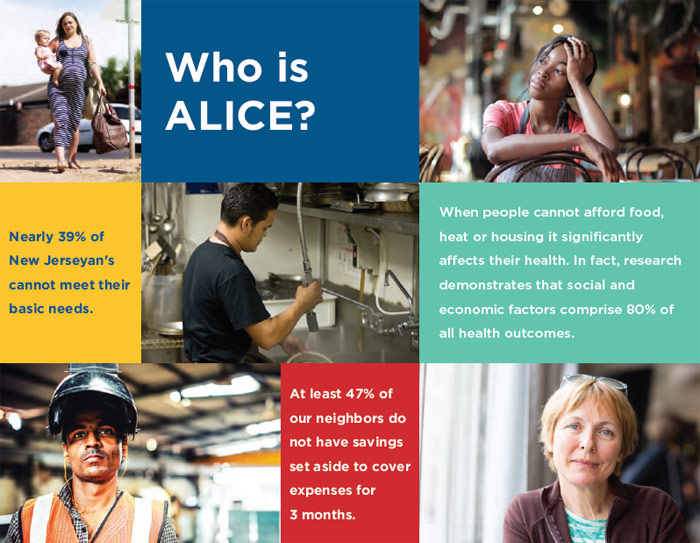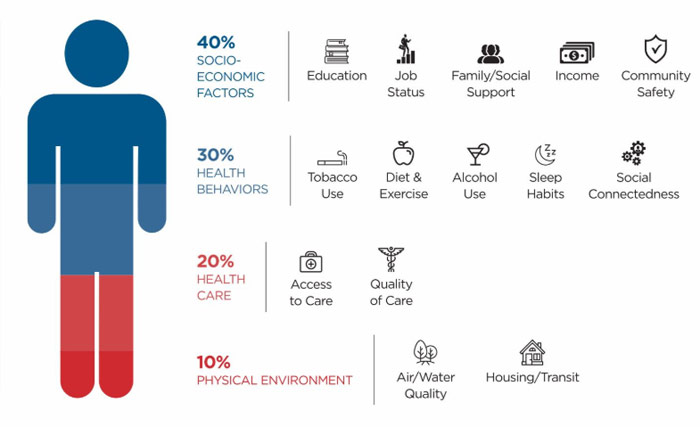Who is ALICE?

ABOUT ALICE
ALICE, a United Way acronym which stands for Asset Limited, Income Constrained, Employed, represents the increasing number of individuals and families who work, but are unable to meet their basic needs, including food, child care, housing, health care and transportation. RWJBarnabas Health is pleased to partner with the United Way on this effort.
- A total of 1,230,061 households in New Jersey (n=38.5%) cannot afford their basic needs, including food, heat, child care, transportation, health care and technology in 2016. Approximately 895,000 (n=28%) of these individuals work; they are ALICE.
- The cost of basic household expenses in New Jersey increased to $74,748 for a family of four (two adults with one infant and a preschooler); 10.5% of the state’s households earn below the FPL and another 28% are ALICE households.
- 51% of all jobs in New Jersey continue to pay less than $20 per hour and 5.6% of the population, aged 16 and older, are unemployed and seeking employment.
|
When people cannot afford food, heat or housing it significantly affects their health. In fact, research demonstrates that social and economic factors comprise 80% of all health outcomes. For years it has been understood that a person’s zip code is a better predictor of their health outcomes than their genetic code, and New Jersey is no exception. While New Jersey ranks on par with the nation in many of its health outcomes, many of its cities fall woefully behind; vulnerable populations suffer from poor health, social, and economic outcomes. |

SOCIO-ECONOMIC FACTORS
- 16.9% of children live in poverty
- 5.6% of the population, aged 16 and older, are unemployed and seeking employment
- Property crimes and violent crimes in NJ are on the decline, however in 2016 there were over 160,000 total incidents, including 1,453 rapes, 395 homicides, and 688 suicides
- Among persons 15 to 29 years of age, homicide is the second leading cause of death in New Jersey and the US. In NJ, homicides disproportionately occur to young black males, conversely white males in the State commit suicide more than twice as often as other individuals
-
10.3% or nearly one million New Jerseyans are food insecure
- 740,600 New Jerseyans are on SNAP (Supplemental Nutrition Assistance Program), formerly known as food stamps and receive an average of $142 per month to feed their families
- 1/3 of these individuals make too much money to qualify for SNAP
- 1 in 15 New Jersey workers benefi t from SNAP
- 298,000 children in the Garden State go to bed hungry
- 200,000 older adults do not have enough to eat
- 1 in 5 Community College students are hungry
- While 90.5% of New Jersey residents graduate from high school, this rate drops for vulnerable neighborhoods such as Newark and New Brunswick, which have graduation rates of 71% and 70% respectively. Additionally, when analyzing graduation rates by race 82% of Black students graduate, 83% of Hispanic students graduate, and 75% of students with limited English proficiency graduate.
HEALTH BEHAVIORS
- 26% of adults are obese
- 18% drink alcohol excessively and 24% of driving deaths include alcohol involvement
HEALTHCARE
- 13% of the population under age 65 lacks medical insurance
PHYSICAL ENVIRONMENT
- 23% of households in the state, struggle with overcrowding, high housing costs, or lack of kitchen or plumbing facilities



